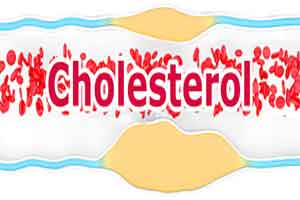- Home
- Editorial
- News
- Practice Guidelines
- Anesthesiology Guidelines
- Cancer Guidelines
- Cardiac Sciences Guidelines
- Critical Care Guidelines
- Dentistry Guidelines
- Dermatology Guidelines
- Diabetes and Endo Guidelines
- Diagnostics Guidelines
- ENT Guidelines
- Featured Practice Guidelines
- Gastroenterology Guidelines
- Geriatrics Guidelines
- Medicine Guidelines
- Nephrology Guidelines
- Neurosciences Guidelines
- Obs and Gynae Guidelines
- Ophthalmology Guidelines
- Orthopaedics Guidelines
- Paediatrics Guidelines
- Psychiatry Guidelines
- Pulmonology Guidelines
- Radiology Guidelines
- Surgery Guidelines
- Urology Guidelines
Excess Good Cholesterol May Shorten Your Life

Washington : Too much of a good thing may not always be better for your health. Researchers have shown that high levels of high-density lipoprotein (HDL) cholesterol commonly touted as “good cholesterol” for helping to reduce the risk of stroke and heart attack may increase a person’s risk of premature death as much as its low levels.
The research suggests that intermediate levels of HDL cholesterol may increase longevity.
“The findings surprised us,” said the study’s senior author Ziyad Al-Aly, Assistant Professor at Washington University School of Medicine in St. Louis, Missouri.
“Previously it was thought that raised levels of the good cholesterol were beneficial. The relationship between increased levels of HDL cholesterol and early death is unexpected,” Al-Aly said.
Cholesterol is a fatty substance found in the blood that can narrow and block heart vessels, causing cardiovascular disease and stroke.
For years, HDL cholesterol has been credited with helping to remove plaque-building “bad cholesterol” from arteries.
For this study, researchers studied kidney function and HDL cholesterol levels in more than 1.7 million male veterans from October 2003 through September 2004.
Researchers then followed participants until September 2013.
In the study, published in the Clinical Journal of the American Society of Nephrology, the researchers showed that both high and low HDL cholesterol levels were associated with an increased risk of dying among study participants with all levels of kidney function.
“Too low and too high are both associated with higher risk of death,” Al-Aly said.
Whether maintaining intermediate HDL cholesterol levels may increase longevity will need to be explored in future studies, Al-Aly said.

Disclaimer: This site is primarily intended for healthcare professionals. Any content/information on this website does not replace the advice of medical and/or health professionals and should not be construed as medical/diagnostic advice/endorsement or prescription. Use of this site is subject to our terms of use, privacy policy, advertisement policy. © 2020 Minerva Medical Treatment Pvt Ltd